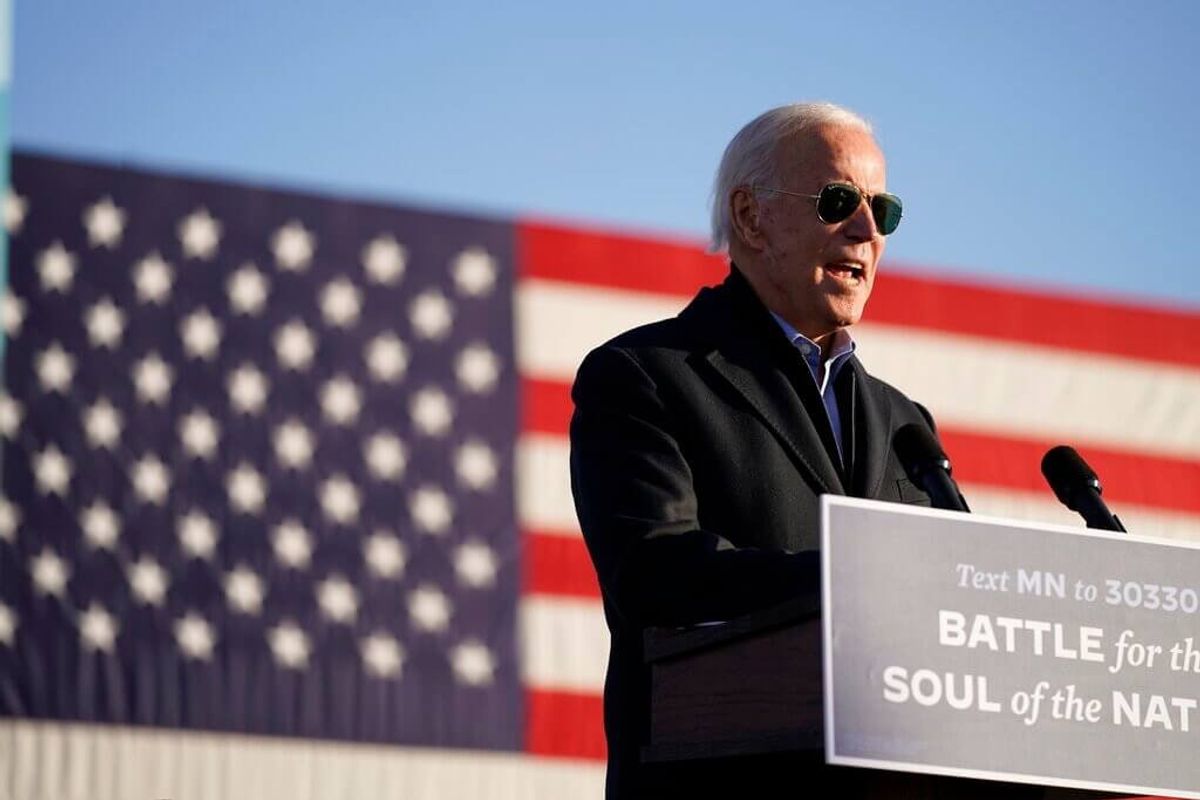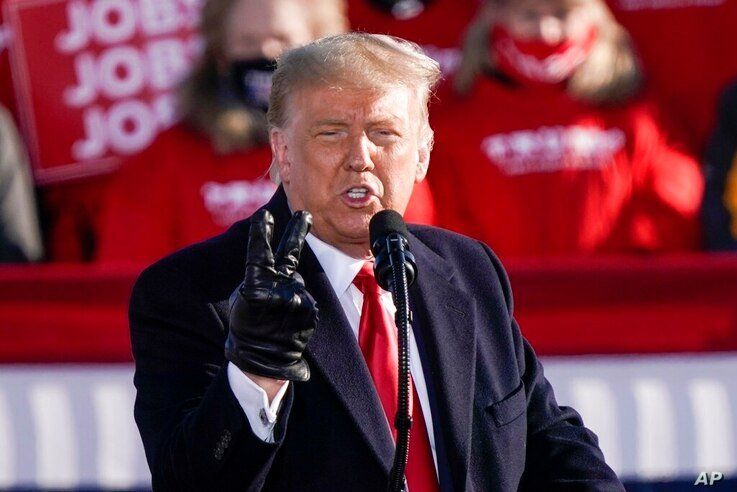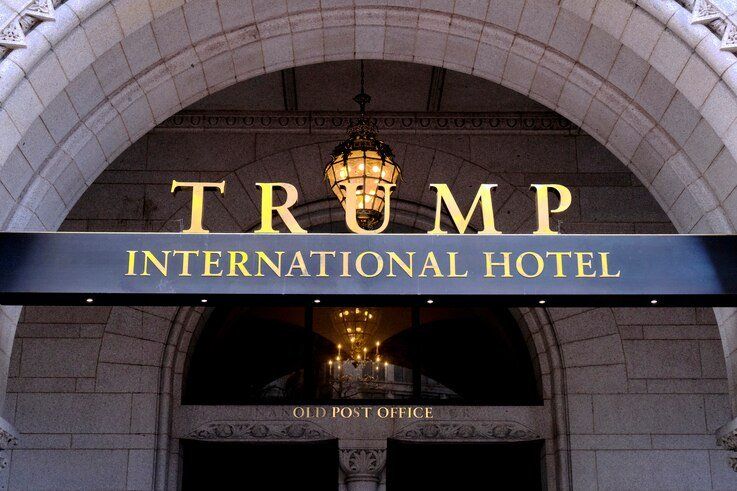
Trump, Biden Campaign in Battleground States
With just a few days until voters cast the last ballots in the U.S. presidential election, both top candidates were focusing campaign efforts Friday on four Midwestern battleground states.
President Donald Trump campaigned Friday in Michigan, Minnesota and Wisconsin, while former Vice President Joe Biden campaigned in Minnesota, Wisconsin and Iowa.
Michigan has 16 electoral votes, Minnesota and Wisconsin have 10 each, and Iowa 6.
Biden told supporters at a drive-in rally at the Iowa State Fairgrounds in Des Moines that the state had hit daily record numbers of coronavirus cases and hospitalizations this week and argued that Trump “has given up” on fighting the virus.
He said, “Unlike Donald Trump, we will not surrender to the virus.”

Trump told supporters at an outdoor rally in Waterford Township, Michigan, that Biden had predicted a dark winter ahead because of the coronavirus pandemic.
“Just what our country needs is a long, dark winter and a leader who talks about it,” Trump said.
The president said a safe vaccine would be delivered to Americans in a matter of weeks, adding that it would be free because “this wasn't your fault. This wasn't anyone's fault. This was China's fault.”
Trump’s son, Donald Trump Jr., downplayed the virus, saying Thursday on Fox News that coronavirus deaths had dropped to “almost nothing” on a day nearly 1,000 Americans died from the virus. In total, more than 229,000 Americans have died from COVID-19 since the pandemic began, according to data from the Johns Hopkins Coronavirus Resource Center.
In Minnesota, Biden faced a group of pro-Trump protesters at his drive-in rally at the State Fairgrounds in St. Paul. Protesters with pro-Trump flags honked their horns and shouted as Biden gave his speech.
Biden acknowledged the protesters, saying they “are not very polite — but they’re like Trump.”
In Wisconsin, Trump told a cheering crowd in Green Bay, "We're going to win, we're going to win this state." Polls show the president trailing Biden in the state, but Trump said he is supported by “hidden” voters, “people that don't want to talk about it. They just go out to vote for Trump."
On Thursday, Trump and Biden focused their campaign efforts on the southeastern state of Florida, which the president won in 2016.
“If Florida goes blue, it’s over. It’s over,” Biden told a drive-in rally outside Broward College, referring to the Democratic Party color.
WATCH: Blue states and red states
Sorry, but your browser cannot support embedded video of this type, you can download this video to view it offline.
Download File360p | 3 MB480p | 5 MB540p | 5 MB720p | 10 MB1080p | 21 MBOriginal | 71 MB Embed" />Copy Download Audio
Biden criticized Trump for holding packed rallies amid the coronavirus pandemic where most attendees are not wearing masks, calling them "super-spreader events."
The president is “spreading more than just coronavirus. He’s spreading division and discord,” Biden said at a second drive-in rally later in the day in Tampa that was cut short by rain.
Trump, addressing a large crowd in a stadium parking lot in Tampa, again predicted heavy Republican voter turnout — “a great red wave” — on November 3.
“We’re going to win this election so big. You watch,” the president predicted.
Trump had been scheduled to hold another rally later Thursday in North Carolina, but because of “very bad weather,” including high winds, the event was postponed until Monday, he told reporters.
In every election since 1996, the winner of Florida has won the presidency. The winner there earns 29 of the 270 electoral votes needed to clinch the election.
According to an average of major polls compiled by the website Real Clear Politics, Biden and Trump are virtually tied in Florida and North Carolina, while the president trails the former vice president in Michigan, Pennsylvania and Wisconsin.
National polls typically show Biden with a lead of 7 or 8 percentage points over Trump, although the margin is about half that in several key battleground states that are likely to determine the outcome in the Electoral College.

Americans are voting early for Tuesday’s presidential election in unprecedented numbers, a product of strong feelings for or against the two main candidates and a desire to avoid large Election Day crowds at polling stations during the pandemic.
More than 80 million people had already voted as of Thursday, well above half of the overall 2016 vote count, which was 138.8 million.
About two-thirds of America’s early voters have mailed in or dropped off their ballots, and the rest voted in person at polling places throughout the country.
Biden voted Wednesday in Wilmington, Delaware, while Trump cast his ballot Saturday at a library in West Palm Beach, Florida, near his Mar-a-Lago resort.

Trump, meanwhile, told reporters before leaving the White House Friday for a rally in Michigan that he was undecided about his election night plans. The New York Times had reported Friday that he plans to appear at the Trump International Hotel in Washington.
“We haven’t made a determination,” Trump said in response to a reporter’s question about his whereabouts on election night.
Trump said coronavirus restrictions imposed by the local government in Washington, including a ban on gatherings of more than 50 people, would be a factor in the decision.
“You know, Washington, D.C., is shut down. The mayor has shut it down. So we have a hotel; I don’t know if it’s shut — if you’re allowed to use it or not, but I know the mayor has shut down Washington, D.C. And if that’s the case, we’ll probably stay here or pick another location,” Trump added.
The Times report, which cited a person familiar with the plans, said Trump would likely instead spend the evening at the White House, despite multiple fundraising solicitations his campaign sent to supporters to attend an election night party at his namesake hotel.
 Trump, Biden Head to Battleground States FridayNext PostCarter Center Works to Educate US Voters
Trump, Biden Head to Battleground States FridayNext PostCarter Center Works to Educate US Voters







